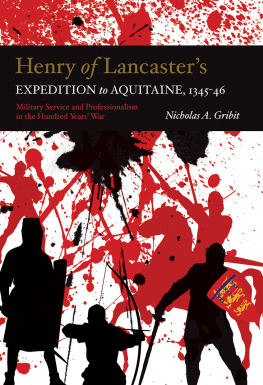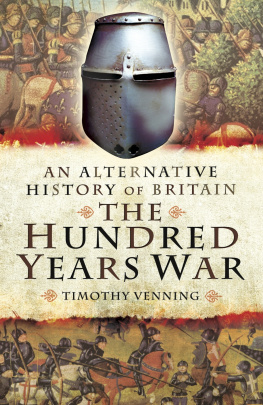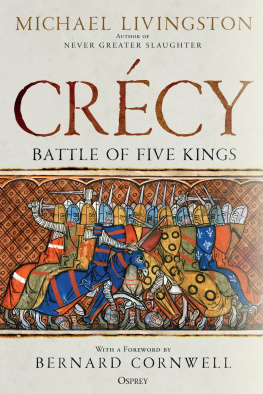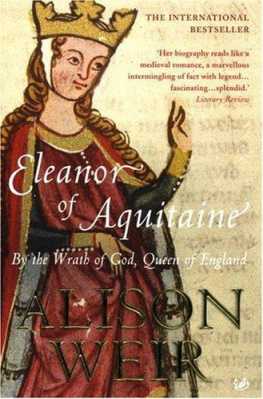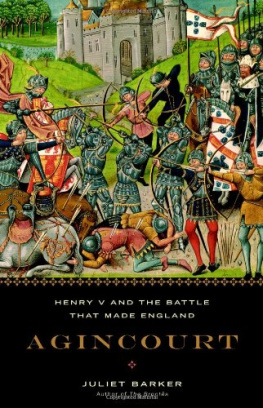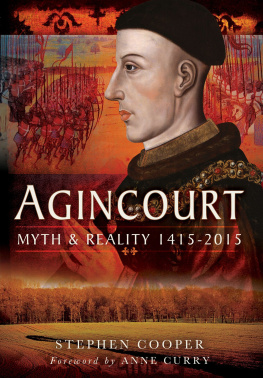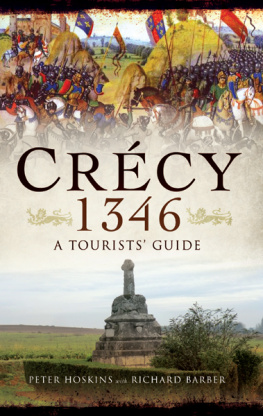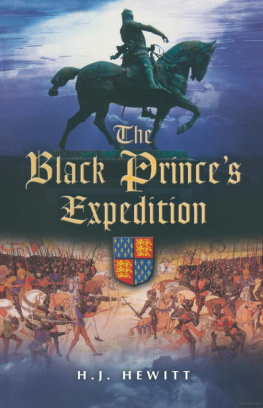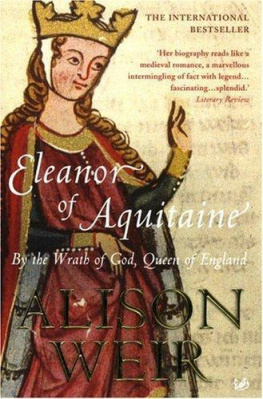Contents
WARFARE IN HISTORY
Henry of Lancasters Expedition to Aquitaine, 1345
In 1345 Henry of Lancaster, earl of Derby the most prominent soldier, diplomat and statesman of his generation led an English royal army to the duchy of Aquitaine and inflicted two devastating defeats on the French royal forces. These were the first decisive victories for either side, and swung the course of the Hundred Years War dramatically in Englands favour. The remarkable success of the expedition, however, has been overshadowed in history by Edward IIIs more celebrated victory at Crcy the following year.
This reassessment of a neglected campaign draws on a wealth of original source material to furnish an examination of the campaign in the round; recruitment, preparations and financial administration, as well as its events and achievements, are examined closely. A detailed biographical study of the individuals who took up arms under Lancasters command forms a main part of this work: the portrayal of hundreds of careers in arms allows us to glean a sense of what life was like for soldiers in this army and in the later Middle Ages in general. An investigation of the mens martial experience, motivations for service and personal military networks provides an understanding of how and, indeed, why the army was so effective in the field of war. It also reveals much about the emergence of professionalism in English medieval armies and offers a reassessment of Lancasters importance as a captain, administrator and diplomat, and above all, as a successful military commander.
Nicholas A. Gribit gained his PhD from the University of Leeds.
WARFARE IN HISTORY
ISSN 1358779X
Series editors
Matthew Bennett, Royal Military Academy, Sandhurst, UK
Anne Curry, University of Southampton, UK
Stephen Morillo, Wabash College, Crawfordsville, USA
This series aims to provide a wide-ranging and scholarly approach to military history, offering both individual studies of topics or wars and volumes giving a selection of contemporary and later accounts of particular battles; its scope ranges from the early medieval to the early modern period.
New proposals for the series are welcomed; they should be sent to the publisher at the address below.
Boydell and Brewer Limited, PO Box 9, Woodbridge, Suffolk IP 12 3 DF
Previously published volumes in this series are listed at the back of this volume
Patri Meo
Contents
Illustrations
Maps
Map 1 authored by Simon J. Harris and Guilhem Ppin. Maps 27 produced by Simon J. Harris with the direction of Nicholas A. Gribit.
Tables
The publication of this book has been made possible by a grant from The Scouloudi Foundation in association with the Institute of Historical Research.
Preface and Acknowledgements
What follows is the culmination of several years of research which has led me through the doors of numerous archives and libraries in England and across the way in France. The search through voluminous original documents and records, and the consultation of published primary sources, has been a lengthy process; such a task cannot be completed without enduring some level of tedium, but feelings of this sort are easily eclipsed by the excitement of discovering new pieces of evidence which, however significant, can throw further light on the subject of medieval English armies and the lives of the individuals who constituted them.
From the outset of this research it was my intention to write a clear and rounded account of an English military expedition (134546) that would appeal to students, academic researchers and the general reader alike. In this fashion I have endeavoured to further our understanding of medieval warfare, but if this present work only succeeds in sparking the interest of a curious mind, or aids the research of somebody else, then I shall be replete.
There are a handful of individuals and institutions to whom I am greatly indebted for their generous help and support in bringing this current work to fruition. Firstly, I wish to acknowledge the grant made by the Scouloudi Foundation in association with the Institute of Historical Research, which helped make this publication possible. An award from the Extraordinary Research Fund, made by the University of Leeds School of History, enabled me to undertake archival research in France, and I was warmly welcomed by the community of scholars at Universit de Bordeaux III (now Universit Bordeaux Montaigne) who permitted my use of the research institute, Ausonius UMR 5607, during my brief sojourn in the regional capital. The Ranulf Higden Society has also provided a stimulating environment in which I have had numerous queries regarding the translation of complex medieval documents answered.
David Simpkin, David Green and Philip Caudrey have been particularly generous in sharing their research findings. They have offered specialist advice on the careers of those men who fought in the reigns of Edward I and Edward II, who belonged to the affinity of Edward, the Black Prince, and who originated from Norfolk, respectively. James Ross provided valuable help during my numerous visits to The National Archives at Kew; our discussions on the subject of the royal financial administration were always fruitful. I have also benefited greatly from the expert advice of Guilhem Ppin, who has been a constant source of knowledge on all things Gascon. Clifford J. Rogers has kindly allowed me access to his transcript of the unpublished Saint-Omer chronicle this has saved me countless hours that would have otherwise been spent on translating the document.
A warm debt of gratitude is owed to the following colleagues who made time to read draft chapters of the book: Andrew Ayton for his valuable comments on the chapters focusing on Henry of Lancasters military retinue (his extensive work on medieval English armies has been a perennial source of inspiration for my own work); Adrian Bell for his constant support, and for his insightful comments on the final chapter; and Mark Ormrod, who has been a source of encouragement, and has given valuable advice on the subject of war finance.
There are three scholars in particular who deserve special acknowledgement. Simon J. Harris has read and commented on several draft chapters and was the chief architect of the cartography. My doctoral supervisor, Alan V. Murray, also deserves special praise. After a desultory start, our academic partnership flourished his logical approach to the sources has influenced my own understanding of medieval armies and, not least, the final structure of this work has benefited greatly from lengthy discussions in his office. Alan was also kind enough to read a draft of the entire manuscript. The person to whom I perhaps owe the most gratitude is Paul H. W. Booth. He generously read the entire work and meticulously checked my translation of the document that appears in Appendix A. Paul has been a voice of guidance since my undergraduate days it was his special subject classes on the Black Prince which first sparked my interest in the Hundred Years War; from him I have learnt a great deal.
My final thanks are for my family and friends. Thomas Entwistle was kind enough to loan his camera (which has borne witness to many of our shared adventures) on countless occasions to photograph the majority of the documents upon which this research is based. I need not mention here others who have supported my academic endeavours, they know who they are. I should add though that the sometimes seemingly interminable periods of writing are made easier when my brother, and the Frys and the Ramms of this world are around. My Auntie Rowena and Uncle Joe have provided considerable financial support over the course of my research, so to them I say a big thank you. For my parents I need to say little, other than that I owe it all to them; it is my father who inculcated me with a love of the medieval world, and it is to him that this book is dedicated. The last acknowledgement goes to my partner in crime, Layne Harrod, who makes everything I do possible. She has endured the undulating emotions of writing this book and, I dare say, will be partly glad to see Henry of Lancaster and his men leave both of our lives (at least for a short while). Thank you, Layney.

